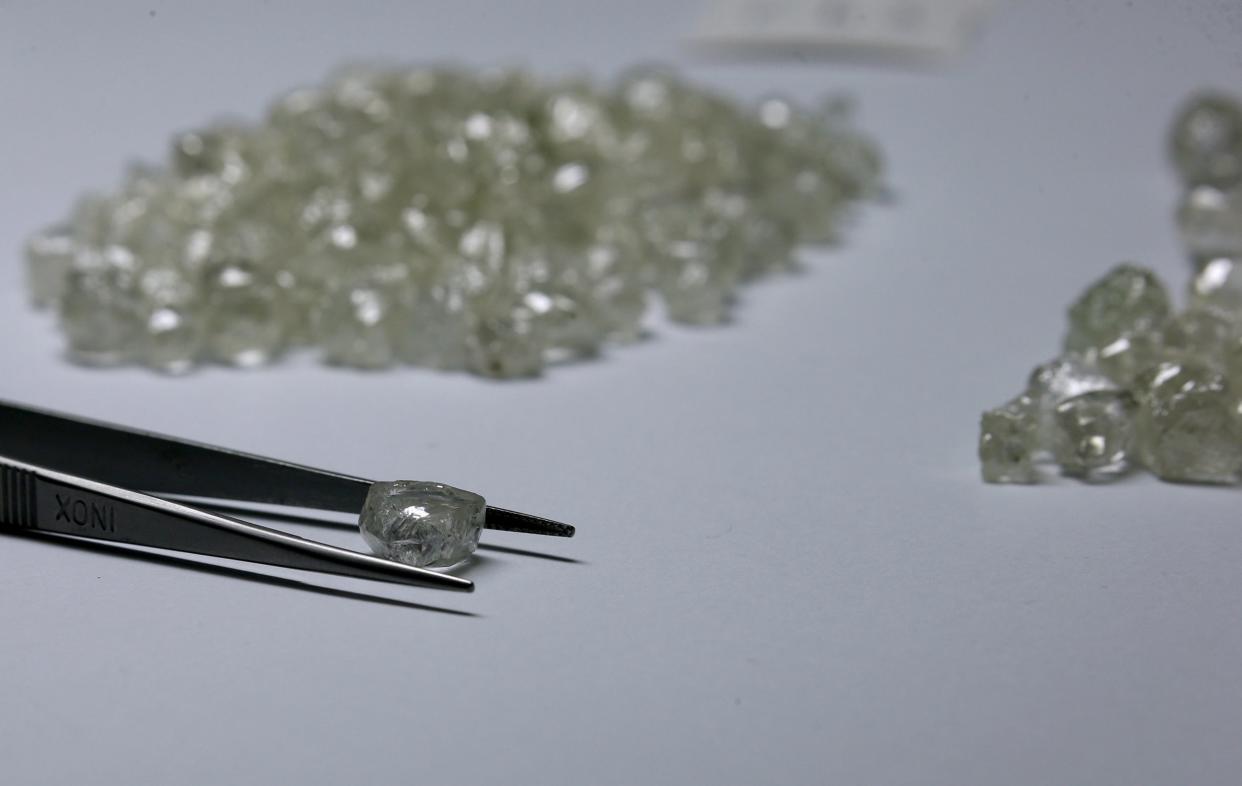Russia is trying to legalise African ‘blood diamonds’

They have been linked to corruption, violence, civil war, rape and murder.
But this week Moscow announced it wanted an end to an international embargo on 'blood' diamonds exported from the Central African Republic (CAR).
According to most estimates, more than 90 per cent of CAR’s diamonds end up being exported anyway – via the black market.
On Tuesday, Alexei Moiseyev, Russia’s deputy finance minister, said it was time to recognise the ban was not working and to legalise the diamond trade in its entirety.
“The current bans are unfair to poor people who can only earn a wage (this way),” he said. “Practically all diamonds end up on the world market as contraband ... with earnings being used by criminals.”
But activists argue the official Russian position is dishonest. They say Moscow is instead interested in cashing in on the trade, noting that actors with close ties to the Kremlin stand ready to benefit from a relaxation of the rules.
“If you are saying you need to lift the ban because it is failing, it’s the wrong idea for the wrong reason,” said Brad Brooks-Rubin of the Enough Project, a non-governmental organisation focused on anti-corruption efforts in the region.
Next year, Russia will chair the Kimberley Process, the UN-brokered scheme designed to stop the flow of diamond profits to armed militias. Representing 82 countries, the scheme claims to be responsible for stopping 99.8 per cent of the global production of conflict diamonds. In reality, it does little to stem the illicit trade in CAR, the only country where conflict diamonds are still a major problem.
In 2013, diamond exports from CAR were banned completely over fears that profits were fuelling some of the country's most violent armed groups. Three years later, the ban was partially lifted for government-controlled regions in the west of the country – but Russia now wants exports from all regions to be made legal.
It is unlikely that Moscow’s initiative to reverse the international embargo on CAR diamonds will be successful, Mr Brooks-Rubin told The Independent. It was not the first time that the argument to lift the bad had been made, he said – it had previously been pushed by Dubai and India, major players in the diamond industry. But the fact that Russia was pushing it meant it would attract “some support”.
Russia is in the process of re-establishing itself as a power in Africa following three decades of relative neglect.
In the Cold War era, Moscow enjoyed good military and trade relations with many counties on the continent. That ended with the fall of the Soviet Union. Now, China is the major player on the continent. But Vladimir Putin wants to change that – and CAR is a central pillar in his strategy.
According to Dmitri Bondarenko, an anthropologist at Russia’s Institute for African Studies, partnership with the impoverished, mineral-rich state is meant to be “demonstrative” of Russia’s designs for the region.
First, he said, CAR was never previously in the Soviet sphere of influence — it is not simply a case of returning to old friends. Second, it was entering into a partnership with Russia for “pragmatic, not ideological” reasons. Third, it was using Russia as a way of reducing dependence on the West — in this case, France.
“It is the first and likely not last switch of its kind,” the academic told The Independent, adding that Moscow would continue to look for such opportunities.
Russia has obvious military goods to bring to the table. In 2018, for example, CAR and Russia signed a security cooperation agreement, under which the Russian army is training the local presidential guard.
But the co-operation also has a much murkier side.
Around the same time that Moscow sent its official soldiers to Africa, private armies also began to show up near diamond mining areas. These mercenaries have since been linked to Yevgeny Prigozhin, a confidant of Vladimir Putin commonly referred to as “Putin’s chef” on account of multiple catering contracts awarded to his companies.
In 2019, it was reported a company associated with Mr Prigozhin was also granted diamond mining rights inside the country.
That context might help explain why Russia is pressing for the diamond market to be liberalised further, said Mr Brooks-Rubin.
“You can assume such groups stand to make financial gain,” he said.
The huge stakes involved were illustrated in 2018 when three investigative journalists were murdered trying to report on Russian links to the CAR diamond industry. According to one investigation, they were killed while under surveillance by men associated with Mr Prigozhin.
Russia has denied control of private armies, which remain illegal under Russian law. It has also denied any connection with the journalists’ deaths.
Read more
Killed Russian journalists were investigating ‘mercenaries’ in Africa

 Yahoo News
Yahoo News 
